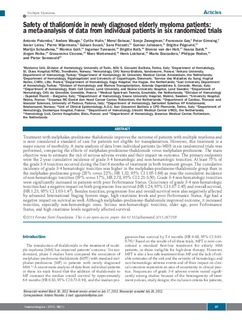Safety of thalidomide in newly diagnosed elderly myeloma patients: a meta-analysis of data from individual patients in six randomized trials
Palumbo, Antonio; Waage, Anders; Hulin, Cyrille; Beksac, M; Zweegman, Sonja; Gay, Francesca; Gimsing, Peter; Leleu, X; Wijermans, P; Sucak, G; Pezzatti, S; Juliusson, Gunnar; Pegourie, B; Schaafsma, Marije; Galli, M; Turesson, Ingemar; Kolb, B; van der Holt, B; Baldi, I; Rolke, Jürgen; Ciccone, G; Wetterwald, M; Lokhorst, H; Boccadoro, Mario; Rodon, P; Sonneveld, Pieter
Journal article, Peer reviewed
Published version
Permanent lenke
http://hdl.handle.net/11250/2624434Utgivelsesdato
2013Metadata
Vis full innførselSamlinger
Sammendrag
Treatment with melphalan-prednisone-thalidomide improves the outcome of patients with multiple myeloma and is now considered a standard of care for patients not eligible for transplantation. However, this treatment is a major source of morbidity. A meta-analysis of data from individual patients (n=1680) in six randomized trials was performed, comparing the effects of melphalan-prednisone-thalidomide versus melphalan-prednisone. The main objective was to estimate the risk of serious adverse events and their impact on outcome. The primary endpoints were the 2-year cumulative incidence of grade 3-4 hematologic and non-hematologic toxicities. At least 75% of the grade 3-4 toxicities occurred during the first 6 months of treatment in both treatment groups. The cumulative incidence of grade 3-4 hematologic toxicities was higher in the melphalan-prednisone-thalidomide group than in the melphalan-prednisone group (28% versus 22%; HR 1.32, 95% CI 1.05-1.66) as was the cumulative incidence of non-hematologic toxicities (39% versus 17%, HR 2.78, 95% CI 2.21-3.50). Grade 3-4 non-hematologic toxicities were significantly increased in patients with poor Performance Status. Occurrence of grade 3-4 non-hematologic toxicities had a negative impact on both progression-free survival (HR 1.24, 95% CI 1.07-1.45) and overall survival, (HR 1.23, 95% CI 1.03-1.47). Besides toxicities, progression-free and overall survival were also negatively affected by advanced International Staging System stage, high creatinine levels and poor Performance Status. Age had a negative impact on survival as well. Although melphalan-prednisone-thalidomide improved outcome, it increased toxicities, especially non-hematologic ones. Serious non-hematologic toxicities, older age, poor Performance Status, and high creatinine levels negatively affected survival.
